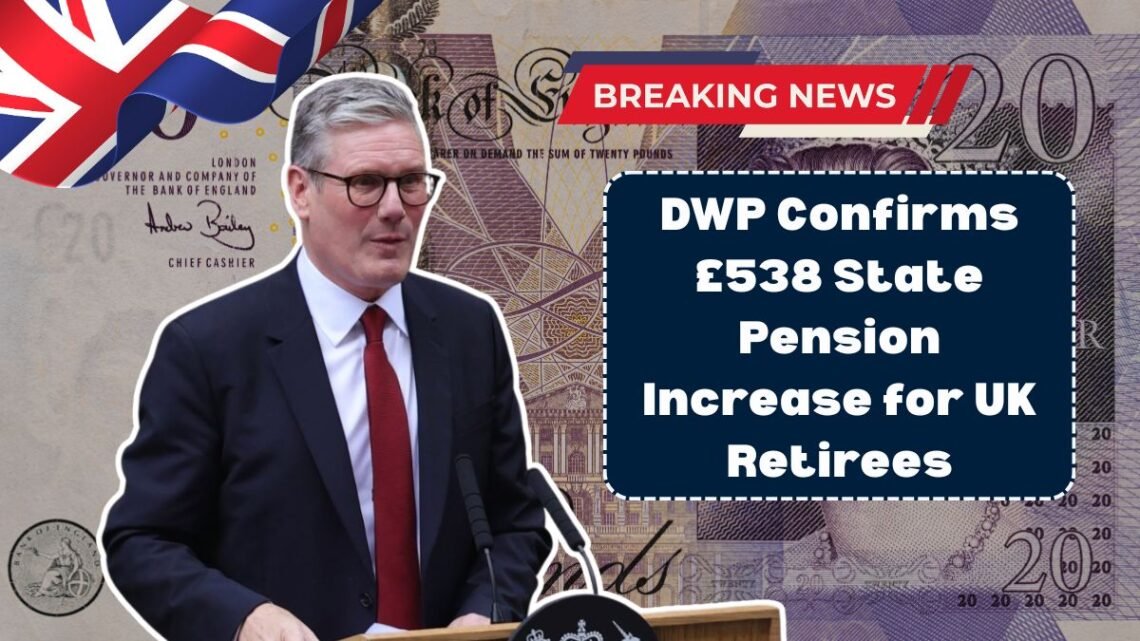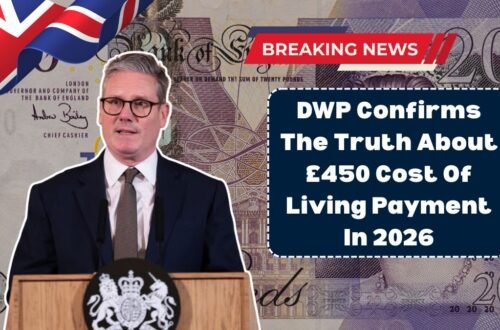The Department for Work and Pensions (DWP) has announced a major update that will offer much-needed financial support to millions of older adults across the UK.
Beginning 17th November, pensioners will receive an annual uplift of £538 to their State Pension, following newly implemented government rules.
With essential costs — including food, utilities, and household bills — still running high, this increase is expected to ease financial pressure for many retirees.
This adjustment forms part of the Government’s ongoing Triple Lock promise. Below is a detailed breakdown of why the rise is happening, who qualifies, and what this means for pensioners in the coming months.
Why the State Pension Is Increasing
The Government has introduced the uplift to help older people keep pace with rising living costs. Although inflation has gradually eased, many pensioners continue to struggle with higher prices for daily essentials.
Under the Triple Lock, the State Pension must rise by whichever is highest among:
- Inflation
- Wage growth
- 2.5%
For this year, strong earnings growth across the UK topped the list, triggering a sizeable increase under the Triple Lock formula. This resulted in the confirmed £538 annual boost for those receiving the full New State Pension.
The Government states the rise helps ensure retirees don’t lose purchasing power as the economy continues adjusting after years of inflation and cost-of-living pressures.
New Pension Rates From 17th November
The £538 annual increase translates into a higher weekly rate for pensioners on the full New State Pension.
Updated State Pension Breakdown:
| Payment Type | Amount |
|---|---|
| Current full New State Pension | £221.20 per week |
| Annual increase | £538 |
| New weekly rate | Approx. £231.60 per week |
Those on the Basic State Pension will also receive an increase, although the exact amount depends on personal contribution history, eligibility, and any additional components.
Regardless of the pension type, all eligible pensioners will benefit from the uplift starting 17th November.
Who Will Receive the £538 Increase?
The DWP confirms that eligibility is broad and straightforward. You will qualify for the increase if you:
- Receive the New State Pension
- Receive the Basic State Pension
- Receive Pension Credit (your State Pension portion will increase)
- Have reached pension age but haven’t yet claimed your pension
Some pensioners living abroad may also receive the uplift, depending on international agreements and country-specific rules.
Every payment issued on or after 17th November will reflect the new increase, regardless of your usual payday.
How the Increase Helps Older People
While £538 per year may seem modest, the rise is expected to significantly support older adults — especially during winter months when energy bills peak.
The increase will help pensioners:
- Manage household and food expenses more comfortably
- Maintain stability on fixed incomes
- Cover higher winter energy usage
- Reduce financial stress, particularly for single retirees
For many, even a small uplift can make weekly budgeting more manageable.
Why 17th November Is the Activation Date
Unlike typical pension increases introduced in April, this adjustment is tied to autumn policy updates. The DWP explains that implementing the rise from 17th November ensures it aligns with finalised wage data and late-year economic reviews.
This timing allows for accurate application of the Triple Lock and ensures pensioners receive the correct amount.
Effect on Pension Credit and Other DWP Benefits
The update also influences Pension Credit, which supports low-income retirees.
Here’s what will change:
- The Standard Minimum Guarantee will increase
- Pension Credit top-up amounts may adjust
- Those receiving both State Pension and Pension Credit will see combined impacts
The DWP encourages pensioners who haven’t applied but may qualify to check their eligibility. Pension Credit may unlock other support including:
- Free NHS dental care
- Housing Benefit
- Cost of Living support
- Council Tax reductions
- Cold Weather Payments
With the new State Pension rise, more people may now meet qualifying thresholds.
Experts Say the Increase Comes at a Critical Moment
Financial specialists argue that although inflation has slowed, many essentials remain significantly more expensive.
Experts highlight that:
- Food prices are still much higher than in 2021
- Energy tariffs remain unstable
- Rents and service charges have risen
- Savings have lost value due to inflation
The £538 uplift gives pensioners a helpful buffer against continued economic uncertainty.
How This Affects Retirement Planning
For those approaching retirement, the updated rates may influence key financial decisions.
Considerations include:
- Whether delaying your pension could increase your long-term entitlement
- How the updated rates affect private pension drawdowns
- Adjustments needed to personal savings plans
- Whether workplace pension contributions should be increased
Understanding the new figures early can help individuals prepare more effectively for retirement.
Could the Pension Increase Again Next Year?
Next year’s Triple Lock increase isn’t confirmed yet, but factors influencing it include:
- Wage growth
- Inflation levels
- Government budget decisions
- Broader economic conditions
If earnings remain strong, pensioners could see another rise next April.
DWP Encourages Pensioners to Check Their Forecast
The DWP suggests that adults under 66 regularly review their online State Pension forecast. This tool shows:
- Estimated pension income
- Projected retirement age
- National Insurance contribution gaps
- Whether topping up NI years is recommended
Checking early helps prevent surprises and improves long-term financial planning.
Why the State Pension Must Continue Rising
The Government says increasing the State Pension is essential to:
- Protect older people from financial hardship
- Sustain the system as the ageing population grows
- Maintain stability and trust in pension policies
- Support retirees during economic transitions
As life expectancy increases, consistent pension rises help preserve the value of retirement income.
What to Expect in the Coming Months
As the new rates take effect, UK pensioners will see:
- Updated payment statements
- Adjusted Pension Credit calculations
- Additional winter support such as Winter Fuel Payments
- Updates in the Autumn Statement
These changes aim to strengthen financial stability during the colder months and beyond.
The confirmed £538 State Pension increase from 17th November marks a crucial step in supporting millions of older adults during a challenging economic period. With living costs still elevated and winter approaching, this uplift offers real financial relief and greater security.
As Britain continues to navigate post-inflation adjustments, pensioners can take comfort in knowing that the Triple Lock system is helping protect their income and preserve their quality of life.
FAQs
Not necessarily. Those on the full New State Pension receive the full amount. Individuals on the Basic State Pension will also see an increase, but the exact figure depends on their contribution history.
It depends on the country of residence. Some international agreements allow the increase, while others do not. The DWP advises checking your specific country’s eligibility rules.
Yes. Pension Credit calculations will adjust automatically once the new State Pension rates take effect from 17th November.






